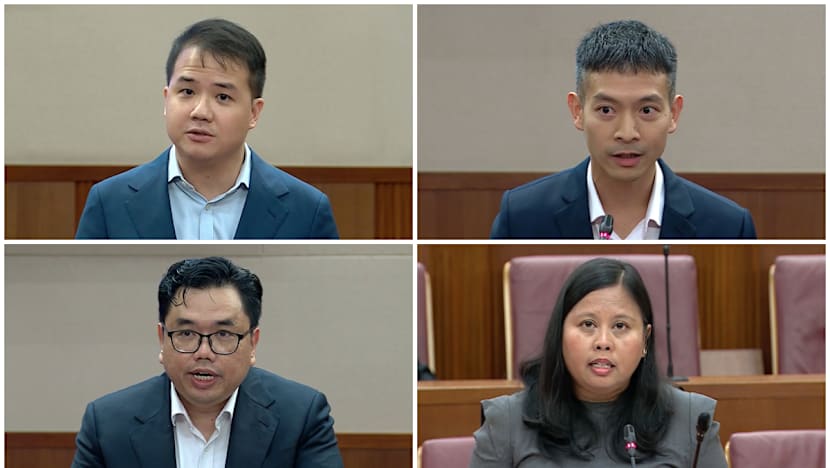MPs discuss meritocracy and jobs for fresh graduates on day 2 of President’s Address debate
The MPs who spoke on Tuesday also built on Monday’s debates, furthering the discussion on AI’s impact on jobs.

From clockwise: NCMP Andre Low, and MPs Shawn Loh, Mariam Jaafar and Fadli Fawzi speaking in parliament on Sep 23, 2025.

This audio is generated by an AI tool.
SINGAPORE: Members of Parliament raised concerns about job opportunities for young graduates, the evolving impact of artificial intelligence and the fairness of meritocracy, as the debate on the President’s Address entered its second day in parliament.
A total of 18 MPs from both sides of the aisle – including political office holders – spoke during more than six hours of debate on Tuesday (Sep 23).
In his address on Sep 5, President Tharman Shanmugaratnam urged a "we first" mindset amid global uncertainty. He also called for continued investment in children, stronger career pathways for workers and greater support for lower-income families.
“This is the promise of Singapore: that birth does not dictate destiny, that no one is left behind, and that every generation can look ahead with optimism and hope,” Mr Tharman had said.
He also emphasised that trust built through years of collaboration between the government, employers and unions would help Singapore adopt new technologies like AI while mitigating disruptions to the workforce.
MERITOCRACY A "PRINCIPLE OF FAIRNESS"
MP Mariam Jaafar (PAP-Sembawang), who spoke about inequality, described the cycle of disadvantage as “brutal” and called on Singapore to break this cycle. She proposed three pathways: through education, health, and career.
Towards the end of her speech, Ms Jaafar also rebutted MP Fadli Fawzi (WP-Aljunied), saying that the opposition member had painted meritocracy as “corrosive” and an “ideological belief to justify and explain away inequality and the lot of those left behind”.
“Meritocracy in Singapore is not an ideology; it is a principle of fairness. The danger is not in practising meritocracy but in abandoning it, because success … dependent not on effort or talent, but on connections and privilege, that is not a ‘we first’ society. That is a 'some first’ society,” Ms Jaafar said.
She said the system still had room for improvement and was a progressive one.
“And while we must keep improving our system, I hope we remember, both Fadli and I are ourselves beneficiaries of Singapore’s meritocracy. It is this system that enabled us - children from ordinary families - to study, to work, and now to serve in this House,” Ms Jaafar said, adding that there was no need to “disparage” or “dismiss” the system.
In response, Mr Fadli said Ms Jaafar had mischaracterised his speech and that he did not call for abandoning meritocracy.
“What I was saying was that meritocracy, when it's taken to the extreme - it discourages our solidarity with the vulnerable. And I believe even in her speech ... she gave a lot of examples of the people who are falling through the cracks of the system. And I think ultimately these are the people who … we both are advocating for,” he said.
Ms Jaafar replied that taking meritocracy to the extreme was “precisely the problem” of Mr Fadli’s argument.
She said that Singapore did not take meritocracy to the extreme, but adapted it and was practical with its application.
“I do not discount that there are people who are really struggling, and I meet them every day, and I try my best to help them every day, but you cannot blame them on meritocracy,” she said.
IMPACT OF AI
Several MPs continued Monday's debate on how AI is reshaping the labour market.
Non-Constituency MP Andre Low (WP) proposed a “redundancy insurance for the AI age” on top of the existing Jobseeker Support scheme.
Under his proposal, affected workers would receive 40 per cent of their last drawn salary - capped at 40 per cent of the prevailing median income - for up to six months.
The scheme will be funded by “small equal contributions” from employers and employees, which at 0.1 per cent of their monthly salary, would amount to over S$5 (USD$3.90) a month for the median income earner, of which half is paid by the worker.
Mr Shawn Loh (PAP-Jalan Besar) said he supported the intent of the proposal but questioned if the numbers added up. Such a scheme would collect S$150 million a year from 2.5 million workers, while the Ministry of Manpower has already set aside S$200 million just for the Jobseeker Support scheme.
Singapore may be at a disadvantage as a new era of deglobalisation results in multinational company (MNC) headquarters being increasingly located near to manufacturing or nearer to markets, said MP Shawn Loh. He called for a renewed policy focus on growing Singaporean MNCs, saying the Government can do more to support local firms to scale beyond the SME level. Mr Loh also urged a pivot away from broad-based SkillsFuture initiatives towards a greater emphasis on employer-led training. This is because the best place to pick up relevant skills is in the workplace and workers benefit as they are assured of a job before committing to training. In parliament on Tuesday (Sep 23), Mr Loh also spoke about new challenges for town planning and policymaking brought about by extreme longevity. His suggestions included an expanded Silver Support Scheme for the oldest five per cent of the population. Finally, he addressed wealth inequality, which he described as the new challenge of this generation. He warned that if it is not tackled quickly enough, it will threaten to divide society.
“A national unemployment or national redundancy insurance scheme should cost more and not less,” he said.
Mr Low responded that the Jobseeker Support scheme “excludes even the median income earner,” given one of the qualifying criteria is a monthly salary capped at S$5,000.
He added that the redundancy insurance model builds up reserves over time and is more fiscally sustainable than the taxpayer-funded Jobseeker Support Scheme.
Automation that has been accelerated by AI was also critiqued by Ms Denise Phua (PAP-Jalan Besar).
She said that those who are less digitally literate face the risk of exclusion as more transactions and communication channels move online.
“For many, this is not convenience, this is a barrier,” she said.
She suggested funding for “human-centric services” such as phone hotline services, printed CDC vouchers and in-person assistance.
“As long as there are citizens in our midst who cannot catch up, these measures are not regressive, they are vital lifelines of inclusion,” she said.
YOUNG GRADUATES’ JOB SEARCH
Senior Minister of State for Manpower Koh Poh Koon noted that global factors and growing concerns about AI taking over entry-level jobs have amplified anxieties among fresh graduates.
He noted that even though the employment rate of graduates in the 2025 cohort as of June increased by 4 percentage points, compared to the previous cohort of the same period last year, significantly more had been actively looking for jobs.
This increase in active jobseekers could have led to a stronger sense of competition for jobs.
He noted that the Graduate Industry Traineeship (GRIT) programme was launched to boost opportunities for fresh graduates and to help them gain industry-relevant experience.
The experience would help facilitate their transition into full-time employment should they face difficulties in their job search.
Under the scheme, up to 800 traineeships will be offered by private firms and the public sector from next month.
Other MPs warned that AI could disrupt prospects for these jobseekers. MP Gho Sze Kee (PAP-Mountbatten) said entry- and mid-level job opportunities could shrink in the near future. “New graduates may face tough prospects, a trend that we are already beginning to see,” she said.
MP Louis Chua (WP-Sengkang) said fresh graduates were "justifiably anxious". "AI-driven, seniority-biased technological change may disproportionately impact juniors and entry-level positions,” he said.
He called the GRIT programme a good start, but suggested incentivising entry-level role creation. If traineeships mimicked full-time workers' duties, the government should take the lead in levelling pay and benefits, Mr Chua said.
Trainee allowance under GRIT will range from S$1,800 to S$2,400 per month, depending on the scope of each traineeship.



















